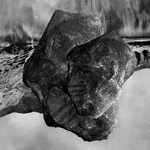|
|
 |
Dusted Reviews
Artist: Sylvain Chauveau & Stephan Mathieu Album: Palimpsest Label: Schwebung Review date: Sep. 26, 2012 |

|
|
|
 |
A palimpsest is a page that has been reused after having its original writing scraped off. In ancient times, parchment wasn’t cheap, so documents deemed inessential would be scrubbed clean and reused; since the erasure was often incomplete, scholars have been able to lift all manner of ancient lore from recycled pages. I’m not sure how much ancient wisdom lies in the grooves and/or binary codes that bind Palimpsest’s music; its texts were all written by Bill Callahan, the artist formerly known as Smog, and the people who inhabit his songs are usually even less wise than they think they are. But the title still holds because the music is made from layers of rewriting and repurposing.
Palimpsest’s genesis lays in some music that German sound artist Stephan Mathieu sent to French multi-instrumentalist Sylvain Chauveau for possible re-working; neither is known for song-oriented work. Mathieu is a lapsed jazz drummer who switched to electronics in the 1990s, although evidence suggests that he is no longer in their thrall; he once memorialized a series of equipment failures by naming a solo album The Sad Mac and his preferred sound sources of late are pre-digital gramophones, virginals, shortwave radios, and Farfisa organs. But whatever Mathieu plays gets put through transformative electronic processes that often render them quite unrecognizable as their former selves, and consequently, instantly recognizable as his work. He favors continuous sounds whose gradual rate of change conceals all manner of rich details, like the radio broadcast that pushes up from behind several strata of drone.
An inveterate collaborator, Mathieu has previously worked with Tape, Taylor Deupree and Ekkehard Ehlers. While you might here a voice here and there, it’s chiefly about sound. Chauveau’s music, on his own or in shared endeavors such as On and Arca, is also usually non-vocal and tends toward plush atmospherics and unabashedly romantic flourishes. But when he heard Mathieu’s music he felt moved to do something different. He doesn’t play any instruments on Palimpsest; instead, he renders a half dozen pages from the Callahan songbook in a smoky baritone croon quite similar to David Sylvian’s. Callahan’s singing usually rides ahead of the melody; Chauveau’s hangs over Mathieu’s carpets of electro-acoustic sound like a full moon over a mist-wreathed field.
Even before Callahan wrote the song “America,” he always struck me as an artist who couldn’t have come from anywhere else. His countless exacting portrayals of stunted masculine characters who prize work or personal interests over emotional engagement, his easy lapses into country and western sounds that are as authentic as a cowboy town built on a Hollywood back lot, even the way his loser protagonists get high in the bathtub or feel awkward as they put a jean jacket on over a tie — it all feels as nastily American as Bukowski or Harry Crews. Chauveau doesn’t sound American at all, but he doesn’t use the difference between his vocal accent and the songs’ lyrical accent to overtly transform them. Instead he tweaks their persona by easing up the babe-I-gots-to-ramble quality embedded in Callahan’s voice, so that the songs’ protagonists seem smaller. In Callahan’s voice they demand to be taken seriously, even when they’re objectively pathetic and subjectively drowning in self-pity. They’re creeps who could wreck your life and not care that they had; after the break-up, you’ll want to leave town and not provide a forwarding address. Coming from Chauveau, they become the blues of a pretty guy that you wouldn’t want to date twice.
By Bill Meyer
|







